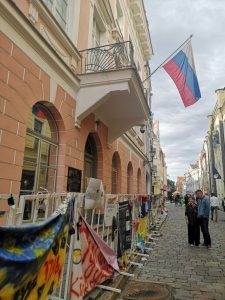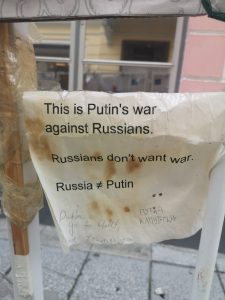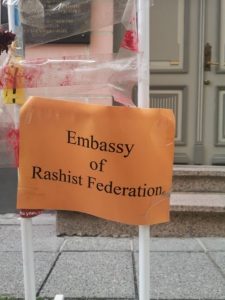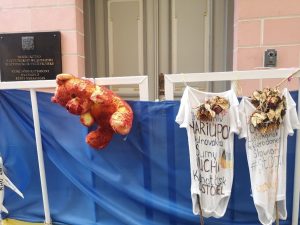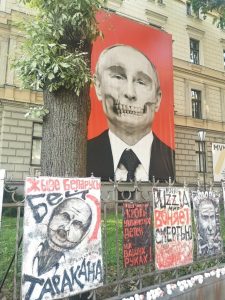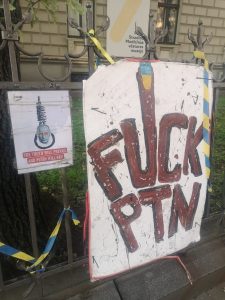Text and photos by Maria Roivas
When visiting Tallinn in July 2022, I coincidentally ran across the Russian embassy on one street in the old town. The area in front of the building was filled with touching protest signs and slogans, symbolic pictures, and people stopping by to contemplate what was happening in Ukraine. Also, there were some angry Russian tourists trying to tear down the protest signs, after which the police came and told them to calm down.
What was happening in front of the embassy, can be understood as ‘conflict transportation’ – a term used in peace and conflict studies to describe how a conflict raging somewhere else can be reproduced and transported in various ways to new sites and locations. The transportation of conflicts can be “discursive, symbolic, physical, or social” (Jensen & Féron, 2021, p. 19), and causes tensions between groups and individuals. In this case, the contestations were happening between those who oppose the war and brought discursive and symbolic messages against the war to public places and Russians who told the police that there should be “no space for politics” in front of the Russian embassy.
The right to protest is a fundamental part of democracy and, by using this right now, people demonstrate their willingness to act and that they care about events in Ukraine.
After this experience in Tallinn, I travelled to Riga. I wanted to see what the surroundings of the Russian embassy looked like there. There was a huge picture of Putin’s face looking like a skull across the street from the embassy. There was also underwear covered in blood to represent rape as a horrible war crime committed by the Russian army in Ukraine.
The right to protest is a fundamental part of democracy and, by using this right now, people demonstrate their willingness to act and that they care about events in Ukraine. By political protest, I mean an individual or collective action to address some kind of issue(s). Those working in Russian embassies have to see these signs and slogans daily. People creating these signs and gathering for demonstrations can feel that they at least somehow contribute to opposing the war and Russia’s actions in Ukraine. I took part in a demonstration in Helsinki right after Russia invaded Ukraine. Even though I was shocked, sad and horrified, gathering with around 10 000 other people and shouting “нет войне” together in front of the Russian embassy made me also feel powerful and hopeful in that moment.
These are only some examples that have been taking place in front of embassies this year. In Poland, protesters brought household goods, like toilet seats, microwaves and washing machines, to decorate the front of the embassy, referencing the alleged looting of household goods by Russian soldiers in Ukraine (Grigorev, 2022, April 14). In Lithuania, attention was drawn to the rape victims of the war. Eighty women put bags over their heads, tied their hands behind their backs, smeared their bare legs with fake blood, and stood in silence for 20 minutes in front of the Russian embassy (Balčiūnaitė, 2022, April 19).
The symbolic role of protests and conflict transportation is crucial in opposing the war.
Conflicts can be transported to other locations, but at least in these cases, there is space and possibility to protest and no worry about imprisonment or persecution. I think these examples exhibit many good things about the democratic societies in which these forms of protest are occurring. The symbolic role of protests and conflict transportation is crucial in opposing the war. No matter what the angry Russians said in front of the embassy in Tallinn, these public spaces are exactly the place for politics and voicing opinions.
Maria Roivas is a master’s degree student in Peace, Mediation and Conflict Research at Tampere University. She is specialising in Russia and Eastern Europe through ExpREES studies at Aleksanteri Institute. At the moment, she is writing her master’s thesis on the meaning of home and sense of belonging to the displaced Ingrian Finnish diaspora.
This blog is a part of a blog series written by the BAMSE Tartu intensive course students. The blog series analyses the impact of crises on the politics of history, challenges of democracy, biopolitics and energy security. This blog is belongs to the challenges of democracy part of the blog series. Read more about the blog series on Bamse News & Events website.
Sources
Balčiūnaitė, S. (2022, April 19). Protest Outside Russian Embassy in Vilnius Draws Attention to
Ukrainian Rape Victims. Lithuanian National Radio and Television. Retrieved from https://www.lrt.lt/en/news-in-english/19/1676291/protest-outside-russian-embassy-in-vilnius-draws-attention-to-ukrainian-rape-victims
Grigorev, A. (2022, April 14). Polish Anti-War Activists Get Creative in Russian Embassy Protest.
Radio Free Europe. Retrieved from https://www.rferl.org/a/russian-embassy-protest-warsaw/31803046.html
Jensen, C. S. & Féron, É. (2021). Diasporas and Conflict Transportation: Challenges and Creative
Practices. TAPRI (Tampere Peace Research Institute).

